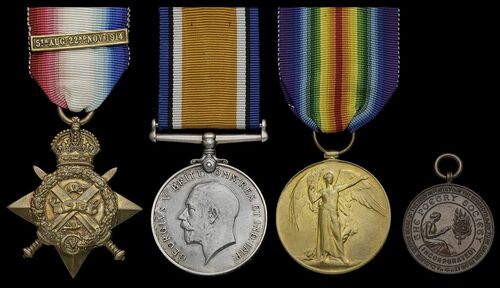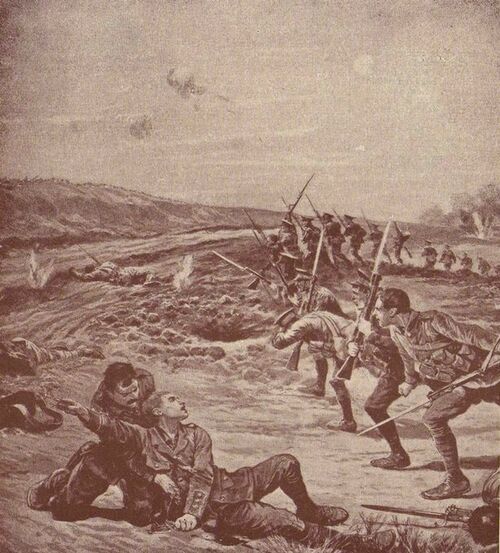Auction: 23001 - Orders, Decorations and Medals
Lot: 101
An outstanding Great War group of three awarded to Lieutenant-Colonel The Honourable W. F. Somerset, Welsh Regiment, a Great-Grandson of Lord Raglan, whose own life was no less full of action
He suffered a severe wound at the Battle of the Aisne and was rescued in an incident which won Sergeant Fuller the Victoria Cross; returned to France he rose to the Command of his Battalion and thence saw yet further service in the Second World War as a Squadron Leader in the Royal Air Force Volunteer Reserve
1914 Star, with copy clasp (Lieut: Hon: W. Fitz: R. Somerset. Welsh:R.); British War and Victory Medals (Lt. Col. Hon. W. Fitz R. Somerset.), polished and overall contact wear, nearly very fine (3)
Wellesley FitzRoy Somerset was born on Hanover Square on 13 June 1887, the second son of Baron Wellesley and Lady Ethel Raglan of 27 Half Moon Street, St. George, Hanover Square. His father was the 3rd Baron Raglan, grandson of Lord Raglan who commanded the British Army in the Crimea, and who had himself fought in the Second Anglo-Afghan War as an officer in the Grenadier Guards. His mother was daughter of the 7th Earl of Bessborough and sister to the 8th Earl who had a distinguished political and business career, being made C.V.O. and K.P. The young Somerset was educated at Eton from 1901-05 before joining the Welsh Regiment from the Royal Monmouthshire Militia in March 1907 to become a professional career soldier. Appearing on the 1911 census as a Lieutenant with the Welsh Regiment, interestingly he is noted as still living at home at this time - although 'home' in this case was the Isle of Man, his father having taken the post of Lord Lieutenant of the island in 1902.
Entering the war on 13 August 1914 with 2nd Battalion, Welsh Regiment he took part in the early fighting through the Battle of Mons (1914 Star & clasp) and the Marne before reaching the Aisne where the retreating German Army had dug in. During the savage battle which developed there, Somerset was hit in the shoulder, The Welsh Regiment, 1914-1918 describing it at ‘smashed’ while attacking the village of Chivey. A newspaper article relates the story that a private soldier found and treated him and having done so said ‘they shall not hit you again, sire’ before lying down before him to shield him from the enemy’s fire.
Carried to a barn and it was here that he, and another officer - Lieutenant Richards - were found by Sergeant W. Fuller who had just carried the wounded Captain Haggard back to this cover after rescuing him under heavy fire. Seeing his charge finally expire from his wounds Fuller busied himself with attending to Somerset and Richards despite the fact that the barn was under heavy shellfire at the time. The wounded were finally taken away by ambulance and, the next day, the barn was hit directly by a shell and utterly destroyed. For these actions, and the rescue of a number of women and children from the area whom he led into a cellar for their own safety, Fuller was awarded the Victoria Cross. Sent home for convalescence Somerset spent some time at Hospital and served on Light Duties with several Battalions of the Welsh Regiment, being promoted Captain on 25 January 1915. Appointed Staff Captain with 9th (Secunderbad) Infantry Brigade he performed this role for several months before again joining 3rd Battalion, Welsh Regiment on 3 November 1915.
Somerset clearly wished to re-join his men and after a long road to full health was allowed to return to France on 16 December 1916. Another reason for his return may have been the heavy losses taken on the Somme, heavy enough for the young and relatively inexperienced Captain to take the rank of acting Lieutenant-Colonel and command his Battalion from 7 January-March 1917. Again returning to England he was posted to 4th Army School as an instructor in November 1917, remaining here for the rest of the war and marrying Edith Lesley Vivian around this time.
Posted to 1st Battalion, Welsh Regiment on 24 May 1919 he joined them in India from 9 August 1919-21 November 1921, being deployed again to Kowloon and Shanghai in 1927. Promoted Major in 1928 Somerset retired in 1935 and by the time of the Second World War he was working as a Civilian Assistant at 125 Flying Training School. Being a member of the Royal Air Force Volunteer Reserve he was soon commissioned to the rank of Flight Lieutenant in 1939 and later promoted Squadron Leader in 1941; a letter from his nephew (the 5th Baron Raglan) states that his role here was ‘as station commander at several airfields on the east coast.’ Somerset died on 26 February 1969 at Carlisle - a tribute from a former comrade stated:
‘It is difficult to pay tribute to one who was so essentially a part of the Regiment and who up to the day of his death was bemoaning the fact that he would be unable to attend the 250th Anniversary Parade and the recent Regimental Parties. He had a multitude of friends in the Regiment with whom he was very popular and many of them, who had known him in his early service continued to call him by his nickname “Ikey” which was far from his character.’
Sold together with copied research including service records, M.I.C., extracts from regimental histories, newspapers and Deeds that Thrill the Empire as well as auction listings for his brother’s medals and extracts from Etonians who fought in the Great War along with a Poetry Society bronze medal engraved 'A. Somerset 13-7-34 (Hons)
Subject to 20% VAT on Buyer’s Premium. For more information please view Terms and Conditions for Buyers.
Sold for
£650
Starting price
£320







